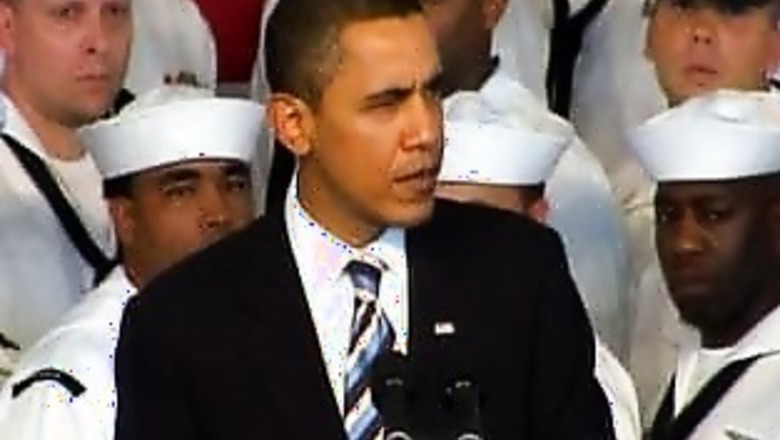
views
Washington: There were tears of joy and a real sense of history in the making. For many African-Americans, Barack Obama's election in November 2008 as President of the US was an undeniable landmark in race relations. One year on, it is not clear just how Obama's unlikely journey to the White House has changed the underlying dynamics between white and black Americans.
Obama entered office facing a torrent of crises - an economy in deep recession, wars in Afghanistan and Iraq and a series of major domestic priorities including health-care reform and tackling climate change.
African-Americans are hard-pressed to find policies specifically tailored to their needs. Obama has governed much as he ran his election campaign: he represents the country, not one minority.
"I personally don't expect (Obama) is going to do anything special to help African-Americans on the economy that he wouldn't do in terms of trying to solve the economic problems in general," says Sam Fulwood, a senior fellow with the Centre for American Progress. "I think it is unfair and unreasonable to think otherwise."
This can still help close the gap. For example, African-Americans will reap more benefits from Obama's push for universal health care: blacks are more likely than whites to lack health insurance.
But Fulwood believes the larger impact for African-Americans lies in what he calls "the atmospherics". There is a broader dialogue about race, and Obama's election instilled a sense of "pride" that gives African-Americans a stronger belief in their own potential.
A USA Today survey this month found that 41 per cent of Americans believe race relations have improved since the election, compared to 22 per cent who say they have worsened.
A majority of African-Americans - 53 per cent - said things have improved since last November. But 72 per cent also found racism remained widespread in the US. For some, racism lies just below the surface in a fierce argument over the direction that Obama's administration is taking the country.
At a local diner in Culpepper, a mostly conservative town in Virginia, servers and customers are reluctant to discuss politics. But when one waitress believed she was out of earshot, she whispered, "After Obama was elected, we got scared."
Former president Jimmy Carter is the highest-profile politician to have suggested that race lies behind some of the most vicious political attacks and fears of Obama.
"I think an overwhelming portion of the intensely demonstrated animosity toward President Barack Obama is based on the fact that he is a black man," Carter told NBC in September.
Conservatives firmly reject the notion of any racial undertones in their attacks. Some lament that Obama's race has had the opposite effect: honest disagreement with the president is now taken as a sign of prejudice.
"I couldn't care less what his skin colour is," says Dan White, a shop owner in Culpeper. "If a conservative was black, I would have voted for him."
Obama has mostly stayed out of the discussion. He has rejected the notion that attacks on him have been racially motivated. Throughout the year, he held very few events or speeches on race relations.
"His reluctance to talk openly, really, about it throughout the campaign, throughout the year, I think is a dismay to some," says Charlton McIlwain, an associate professor of media and culture at New York University.
But McIlwain adds that there are understandable political motivations for Obama's relative silence, "He's been doing exactly what he has to do to survive."
There were some exceptions: the arrest of Harvard University Professor Henry Louis Gates, an African-American, for breaking into his own home in Massachusetts sparked what Obama famously called a "teachable moment".
Obama was quick to chastise police for their handling of the situation. McIlwain says Obama showed African-Americans that he was "willing to step up to the plate" for their cause, but it also gave him a "reality check" about the delicacies of such racially charged incidents.
McIlwain says Obama's biggest impact on race relations may come in a second term, or even once he leaves the presidency, when he will be less inhibited by political considerations.
"I certainly see as the next couple of years go by that you'll increasingly see him talking about and engaging in the issue of race," McIlwain said.



















Comments
0 comment